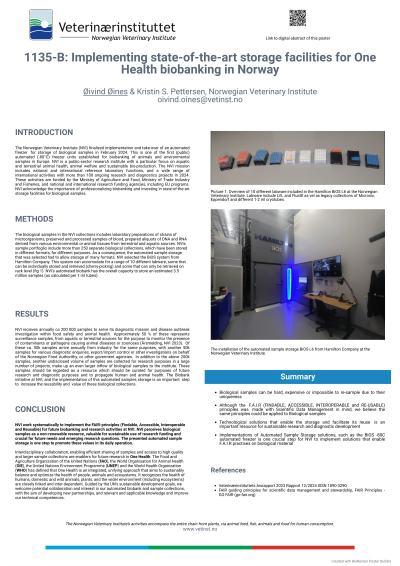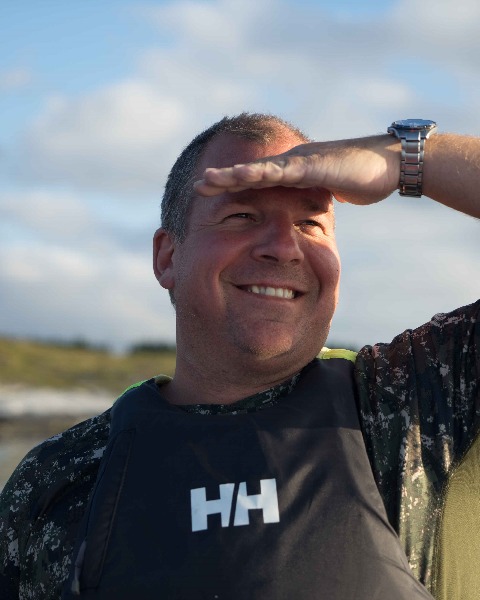Frontiers in Technology
Poster Session B
(1135-B) Implementing state-of-the-art storage facilities for One Health biobanking in Norway
Wednesday, May 29, 2024
10:30 - 11:15 CEST
Location: Exhibit Hall


Oivind Oines, Dr Scient
Senior researcher
Norwegian Veterinary Institute
Aas, Akershus, Norway
Poster Presenter(s)
Abstract: The Norwegian Veterinary Institute (NVI) finalized implementation and take-over of an automated freezer (-80°C) for storage of biological samples in February 2024. To our knowledge, this is one of the first (public) automated freezer units established for biobanking of non-human samples in Europe.
NVI is a public-sector research institute, organised under the Norwegian Ministries of Agriculture and Food, and of Trade, Industry and Fisheries, respectively. NVI provides independent research-based expertise and support to the Norwegian and European authorities with a particular focus on aquatic and terrestrial animal health, animal welfare and sustainable bio-production. The NVI mission includes national and international reference laboratory functions, and a wide range of international activities with more than 100 ongoing research and diagnostics projects in 2024. These activities are funded by national and international research funding agencies, including EU programs. The mission along with the NVI’s values: scientifically ambitious, forward-looking and cooperative, underlines the importance of professionalizing our biobanking activities and investing in state-of-the-art storage facilities for biological samples. NVI’s biological samples and collections includes isolates of bacteria, viruses, parasites and fungi, samples of blood, prepared aliquots of DNA and RNA and various tissues derived from terrestrial and aquatic animals, as well as a diversity of environmental samples. All together, NVI currently manage more than 250 separate biological collections. NVI’s automated biobank has the capacity to store 3.5 million samples and we will work systematically to implement the FAIR-principles (Findable, Accessible, Interoperable and Reusable) for future biobanking activities at NVI. NVI perceives biological samples as a non-renewable resource, crucial for future needs and emerging research questions.
Interdisciplinary collaboration, sharing of samples and larger sample collections are premises for future research in One Health. The Food and Agriculture Organization of the United Nations (FAO), the World Organisation for Animal Health (OIE), the United Nations Environment Programme (UNEP) and the World Health Organization (WHO) has defined that One Health is an integrated, unifying approach that aims to sustainably balance and optimize the health of people, animals and ecosystems. It recognizes the health of humans, domestic and wild animals, plants, and the wider environment (including ecosystems) are closely linked and inter-dependent.
Guided by the UN’s sustainable development goals, we welcome potential collaboration and interest in our automated biobank and sample collections, with the aim of developing new partnerships, and relevant and applicable knowledge and competences.
NVI is a public-sector research institute, organised under the Norwegian Ministries of Agriculture and Food, and of Trade, Industry and Fisheries, respectively. NVI provides independent research-based expertise and support to the Norwegian and European authorities with a particular focus on aquatic and terrestrial animal health, animal welfare and sustainable bio-production. The NVI mission includes national and international reference laboratory functions, and a wide range of international activities with more than 100 ongoing research and diagnostics projects in 2024. These activities are funded by national and international research funding agencies, including EU programs. The mission along with the NVI’s values: scientifically ambitious, forward-looking and cooperative, underlines the importance of professionalizing our biobanking activities and investing in state-of-the-art storage facilities for biological samples. NVI’s biological samples and collections includes isolates of bacteria, viruses, parasites and fungi, samples of blood, prepared aliquots of DNA and RNA and various tissues derived from terrestrial and aquatic animals, as well as a diversity of environmental samples. All together, NVI currently manage more than 250 separate biological collections. NVI’s automated biobank has the capacity to store 3.5 million samples and we will work systematically to implement the FAIR-principles (Findable, Accessible, Interoperable and Reusable) for future biobanking activities at NVI. NVI perceives biological samples as a non-renewable resource, crucial for future needs and emerging research questions.
Interdisciplinary collaboration, sharing of samples and larger sample collections are premises for future research in One Health. The Food and Agriculture Organization of the United Nations (FAO), the World Organisation for Animal Health (OIE), the United Nations Environment Programme (UNEP) and the World Health Organization (WHO) has defined that One Health is an integrated, unifying approach that aims to sustainably balance and optimize the health of people, animals and ecosystems. It recognizes the health of humans, domestic and wild animals, plants, and the wider environment (including ecosystems) are closely linked and inter-dependent.
Guided by the UN’s sustainable development goals, we welcome potential collaboration and interest in our automated biobank and sample collections, with the aim of developing new partnerships, and relevant and applicable knowledge and competences.
